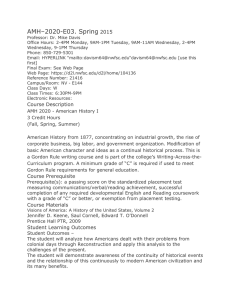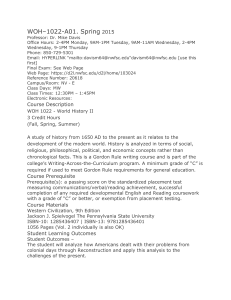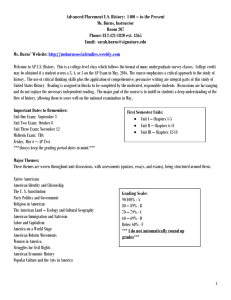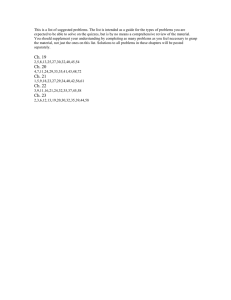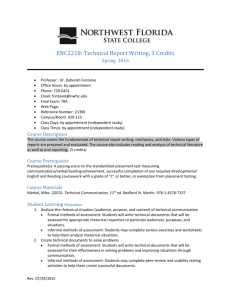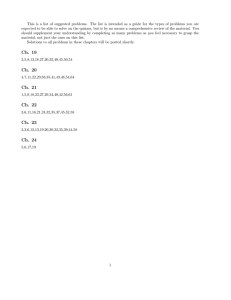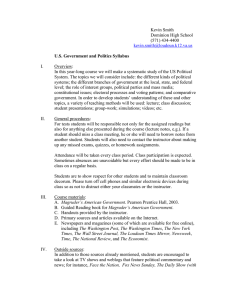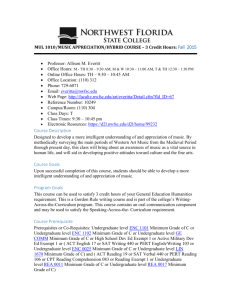AMH–2010-L01. Fall 2015
advertisement
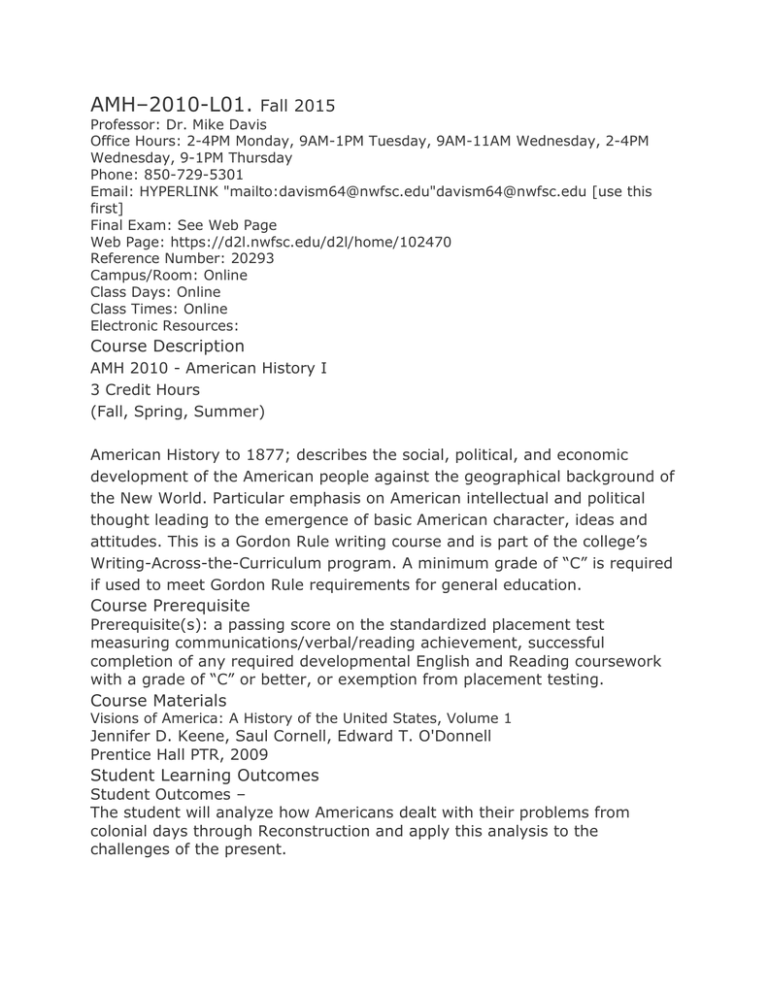
AMH–2010-L01. Fall 2015 Professor: Dr. Mike Davis Office Hours: 2-4PM Monday, 9AM-1PM Tuesday, 9AM-11AM Wednesday, 2-4PM Wednesday, 9-1PM Thursday Phone: 850-729-5301 Email: HYPERLINK "mailto:davism64@nwfsc.edu"davism64@nwfsc.edu [use this first] Final Exam: See Web Page Web Page: https://d2l.nwfsc.edu/d2l/home/102470 Reference Number: 20293 Campus/Room: Online Class Days: Online Class Times: Online Electronic Resources: Course Description AMH 2010 - American History I 3 Credit Hours (Fall, Spring, Summer) American History to 1877; describes the social, political, and economic development of the American people against the geographical background of the New World. Particular emphasis on American intellectual and political thought leading to the emergence of basic American character, ideas and attitudes. This is a Gordon Rule writing course and is part of the college’s Writing-Across-the-Curriculum program. A minimum grade of “C” is required if used to meet Gordon Rule requirements for general education. Course Prerequisite Prerequisite(s): a passing score on the standardized placement test measuring communications/verbal/reading achievement, successful completion of any required developmental English and Reading coursework with a grade of “C” or better, or exemption from placement testing. Course Materials Visions of America: A History of the United States, Volume 1 Jennifer D. Keene, Saul Cornell, Edward T. O'Donnell Prentice Hall PTR, 2009 Student Learning Outcomes Student Outcomes – The student will analyze how Americans dealt with their problems from colonial days through Reconstruction and apply this analysis to the challenges of the present. The student will demonstrate awareness of the continuity of historical events and the relationship of this continuously to modern American civilization and its many benefits. The student will demonstrate understanding of the concept that change has been a constant factor throughout our history. The student will identify the source of their own values and motivations. The student will demonstrate understanding of the psychological climate of the period of American history under study and the reasons for present behavior. The student will demonstrate understanding of trends in American History which indicate the ties of the past, the present, and the future and will provide some general guidelines for the future. The student will demonstrate awareness of the methods by which he/she can participate fully in this democratic society. The student will develop and apply some historical judgment so that he or she can begin to judge the significance of public affairs for himself and so deal discriminatingly with the "constant stream of historical data" he or she faces daily. In addition to the specific course goals listed above this course also addresses the college’s Critical Thinking Communication General Education Goals/Outcomes through the following Student Learning Outcomes (SLO’s): The student will apply reflection, analysis, logical reasoning, and evaluation to formulate judgments, reach decision, and solve problems. The student will demonstrate accurate and effective expository writing skills. Grading Procedures 6 biweekly papers - 25% 6 biweekly quizzes -25% 2 exams (one midterm, one final) - 25% 1 final paper – 25% Participation – Various Incomplete Grades At the discretion of the instructor, an incomplete grade (“I”) may be awarded when the student is unable to finish the required work because of unforeseen extenuating circumstances such as illness or TDY assignment. To receive an “I” grade, the student must have successfully completed a significant portion of the required coursework and be able to finish the remaining work without attending class. An “I” grade will automatically convert to a grade of “F” if the student does not complete the remainder of the coursework by the established deadline. Make-up Work Late assignments may be turned in up to three days late - with one grade off for each day missing (thus an A paper turned in three days late will receive a D) Classroom Conduct Plan to arrive to class on time and to stay for the entire class period (or until dismissed) because random arrivals and exits are disrespectful and distracting. There is NO use of any electronic devices (e.g., cell phones, iPads, smartphones, laptops, etc.) allowed during exams and other graded in-class assignments. Laptop and tablet computers are allowed for (quiet) note taking only: i.e., other activities such as checking personal e-mail or browsing the Internet are discouraged. Students are responsible for what transpired if they miss a class. It is the student’s responsibility to contact a classmate to determine what was missed. Disruptive behaviors are not permitted while classes are in session. Be polite and respectful towards others, instructor and other students. It is the student’s responsibility to notify the instructor of record in advance of a need for accommodation of a disability that has been verified by the University. Students should address faculty as "Professor" or "Dr." Calling faculty by their first names is not appropriate. Students are expected to be professional and respectful of other students, instructors, administration, and staff. That includes verbal and physical behavior as well as language used in email and phone messages. Class Attendance Students who stop attending class or are not able to pass the course due to attendance expectations stated in the syllabus may receive a failing grade of “FA.” An “FA” grade is a failing grade in GPA calculations and may impact the receipt of federal aid in subsequent courses. Students traveling for college approved activities will not be penalized academically but will be responsible for missed work. Minimum Technical Skills and Specialized Technology Utilized This course is totally online. All instructional content and interaction takes place over the World Wide Web (www). In addition to baseline word processing skills and sending/receiving email with attachments, students will be expected to search the internet and upload/download files. In addition, students may need one or more of the following plug-ins: Adobe Acrobat Reader PowerPoint Viewer Windows Media Player QuickTime Player Adobe Flash Player Turnitin – Northwest Florida State College subscribes to Turnitin, an online plagiarism detection and prevention service. By enrolling in this class, you are consenting to upload your papers to Turnitin, where they will be checked for plagiarism. Papers submitted to Turnitin are saved as source documents within the Turnitin database solely for the purpose of detecting plagiarism in other papers. Videos – This course employs lecture capture software to provide you with videos of your instructor’s lectures/PowerPoints/notes/demonstrations, etc., and you are required to watch these. These videos can be viewed with a standard Internet connection. If your home Internet connection is not adequate, please remember that any NWFSC open lab is available to you. You need only take your own headphones with you. Cell Phone/Electronic Devices Cell phones, pagers, and other such electronic devices must not distract from learning. Courtesy to the professor and other students requires that phones be on vibrate or silent mode during class. No student should initiate conversations, including texts, during class activities. Use of electronic communication devices during examinations or other graded activities may constitute grounds for disciplinary action; such devices must be completely out of sight during exams or other assessments. Where emergency or employment situations requireaccess to electronic communication services, arrangements may be made in advance with the instructor. Emergency College Closure In the event of unusual or extraordinary circumstances, the schedule, requirements, and procedures in this course are subject to change. If the college closes for inclement weather or other emergency, any exams, presentations, or assignments previously scheduled during the closure period will automatically be rescheduled for the first regular class meeting held once the college re-opens. If changes to graded activities are required, students will not be penalized as a result of the adjustments, but will be responsible for meeting revised deadlines and course requirements. Children in the Classroom As a courtesy to other students and the learning process, students may not bring children with them to class sessions. Health and safety concerns prohibit children from accompanying adult students in any lab, shop, office, or classroom or other college facility where potential hazards exist. If a child-related emergency means you must miss class, contact the instructor as soon as possible to determine your options. (The full “Children on Campus” policy statement appears in the College Catalog.) Student Rights, Responsibilities, and Academic Integrity Students are responsible for adherence to all college policies and procedures, including those related to academic freedom, cheating, classroom conduct, computer/network/e-mail use and other items included in theNorthwest Florida State College Catalog and Student Handbook. Students should be familiar with the rights and responsibilities detailed in the current Northwest Florida State College Catalog and Student Handbook.Plagiarism, cheating, or any other form of academic dishonesty is a serious breach of student responsibilities and may trigger consequences which range from a failing grade to formal disciplinary action. Optional Space for Instructor Cheating (plagiarism, etc) will result in An F for the first occasion A 0 for the second occasion An F in the course for the third occasion RESOURCES The Academic Success Center (ASC) is located in the Activities Center on the Niceville Campus. The ASC provides free learning support services such as tutoring, ESOL, and writing assistance for all NWFSC students. Individual and group tutoring is available in a wide range of subjects on a walk-in-basis and by appointment. For more information, call the Academic Success Center at (850) 729-5389 or visit our website at HYPERLINK "http://www.nwfsc.edu/Academics/AcademicSupport/FreeTutoring.cfm"Free Tutoring. Reading to Learn (R2L) is a project of Northwest Florida State College designed to support students’ learning through direct instruction of reading strategies. Students may access R2L at our website: HYPERLINK "http://www.nwfsc.edu/Academics/AcademicSupport/ReadingtoLearn/"Reading to Learn. Math Labs are located in the Math Building L, Room L-131, on the Niceville Campus and in Building 7, Room 702 on the Fort Walton Beach Campus and Room 131 at the Crestview Center. The math labs are open to all students and provide free walk-in tutoring for all mathematics courses. For lab hours, students may call the Math Department at (850) 729-5377 or visit our website at HYPERLINK "http://faculty.nwfsc.edu/web/math/mathlab"Math Lab. Smarthinking is an online, real-time tutoring offered free to students, who may access this service via RaiderNet. Open Computer Labs There are numerous open computer labs throughout the Northwest Florida State College campuses. Students may access our website for lab locations and hours: HYPERLINK "http://www.nwfsc.edu/Academics/AcademicSupport/OpenCompLabs.cfm"Comput er lab location and hours Testing Center Testing Centers administer college admissions tests, placement tests, proctored exams, ACT/SAT, GED. CLEP, and DSST (formerly known as DANTES). General information concerning tests, hours Testing Center hours may be accessed on the Testing Center website at HYPERLINK "http://www.nwfsc.edu/Students/Enrollment/TestingCenter/"Testing Center. Makeup exams may be taken in the Testing Center, depending upon instructor policies on late work. Library, Online Reference Materials, and Resources The library is a comprehensive, learning resource center providing information in print, digital, and multimedia formats to support the educational objectives of the College. In addition to in-house materials, online services and resources can be accessed through the LRC website. Library hours are posted each semester at the building entrance and on the LRC website at HYPERLINK "http://lrc.nwfsc.edu/"Learning Resource Center Assistance for Military and Veterans Northwest Florida State College supports our military and veterans students. You may contact NWFSC Eglin AFB Education Services Building at 850-2004180 or NWFSC Hurlburt Center Educational Services Building at 850-2004190 or visit our website: HYPERLINK "http://www.nwfsc.edu/Students/Enrollment/Admissions/Military.cfm"Support Our Military Students with Disabilities Northwest Florida State College supports an inclusive learning environment for all students. If you have disabilities for which accommodations may be appropriate to assist you in this class, please contact the Office of Disability Support Services on the Niceville Campus, or call 850-729-6079 (TDD 1800-955-8771 or Voice 1-800-955-8770. Syllabus Sec 2. Quizzes These are twenty question multiple choice quizzes that you will take every two weeks. These are open-book, open-note quizzes. (Why are they open-book and open-note? To make sure you are using your books and your notes) The quizzes are due on January 31, February 14, February 28, March 13, April 10, April 24 by midnight. The quizzes will open on Monday the week they are due. The quizzes cover the previous two weeks. Quiz 1 (January 31) covers Chapters 1 and 2. Quiz 2 (February 14) covers Chapters 3 and 4 Quiz 3 (February 28) covers Chapters 5 and 6 Quiz 4 (March 13) covers Chapters 7 and 8 Quiz 5 (April 10) covers Chapters 9 and 10 Quiz 6 (April 24) will cover Chapters 11 and 12. Chapters 13 and 14 will be discussed in class and will appear on the final - but you will not be quizzed on them. Short Papers These are 500 word papers due every two weeks. They are due January 31, February 14, February 28, March 13, April 10, and April 24. You will submit these papers by A. Posting a draft to the Discussion Board by the day before they are due (January 30, February 13, etc). B. Posting a comment to someone else's paper on the Discussion Board by the end of the due date (January 31, February 14, etc). C. Posting a final version of your paper by the end of the due date (January 31, February 14, etc) to the Dropbox. Here are the topics of your papers. Paper A (January 31) - Assume you are a Native American living in North or South America in 1710 - and that a European power ‘controls’ the area where you live. Which European power’s territory would you prefer to live in? A good answer will cover both the strengths of your new occupier and the weaknesses (from your perspective) of its rivals. Paper B (February 14) - The American Revolution, a war fought for political and social freedoms against an undemocratic regime, took place in a society with slaves - slavery was legal in all 13 colonies in 1776. How did residents of the colonies deal with this seeming contradiction? A good answer will incorporate the stories of more than one group - enslaved peoples, slaveholding rebels, black Loyalists, etc. Paper C (February 28) - Why were the ‘Founding Fathers’ so frightened by Shays’ Rebellion? After all, they were former revolutionaries themselves - and the farmers of Massachusetts used much the same rhetoric as the revolutionaries of the previous decade. A good answer will show an understanding of the ‘character’ of the American Revolution, as well as the discontents that remained in following decades. Paper D (March 13) - Assume you are a Floridian voter in 1845 - with the viewpoints of a typical Florida voter of the period. Which of the two political parties of the Second Party System do you favor? A good answer will show an understanding of the two political parties of the period and their typical supporters - as well as an understanding of the kinds of people who voted in Florida in 1845. Paper E (April 10) - The early 19th century saw a transformation in the American economy and a transformation in American religion. In your opinion, which was the most important in shaping American history? A good answer will show an understanding of _both_ - so that you can argue which was the most important. Paper F (April 24) - How did anti-slavery sentiment come to dominate Northern public opinion between 1850 and 1860? Note that anti-slavery sentiment is _not_ the same thing as abolitionist sentiment - abolitionists are a minority even in the Republican Party even after the election of Abraham Lincoln Final Paper This is a 2000 word paper You must post your topic to the Discussion Board by February 28 by midnight. You must post your draft to the Discussion Board by April 3 by midnight. You must comment on someone else's paper on the Discussion Board (using the rubric uploaded to that section) by April 10 by midnight. You must post the final version of your paper to the Dropbox by April 24, 2016 by midnight. Your paper topic must cover an event in Florida history before 1877. Your topic must be undeservedly obscure. Your paper must explain why the topic is obscure - and why it should be better-known. For example, say your paper is about the Second Seminole War. It's not enough to simply tell me the history of the war - your paper should speak to the historiography of the war (what have historians said about it?) and your problems with what has been written (for example, the Second Seminole War is usually presented as a war about whites vs. Natives, but it was really a war of whites against Natives and their black allies, something the typical histories of the war have downplayed). You might also suggest a way to fix the problems of how we've done the history of your subject - for example, you might talk about the need to discuss the Second Seminole War in textbooks (and you could here talk about textbooks that _don't_ speak about the war), the need to build more accurate monuments to it (and here you could talk about what monuments exist about the war and what stories are left off the landscape), or perhaps the need to organize a holiday (and here you could talk about what holidays exist in Florida to commemorate Native Americans.) Midterm and Final The midterm exam is due by midnight on March 6. It will open February 29. It is in two parts. Part 1: 50 multiple choice questions drawn from Quizzes 1, 2, and 3. Part 2: 2 essays, which must be answered in multi-paragraph essays with an opening, body, and conclusion. The essays will be drawn from the below five topics. You will find out which two essays you will write when you go to take the exam. 1. Were the Alien and Sedition Acts necessary? 2. Did the American Constitution (as written in 1787) expand or restrict democracy? 3. Was the American Revolution justified? 4. What were the economic and social purposes of slavery in the various English colonies? 5. Why (and in what ways) were the patterns of English and Spanish colonial settlement so different? The final exam is due by midnight on May 8. It will open May 2 It is in two parts. Part 1: 50 multiple choice questions drawn from Quizzes 1, 2, 3, 4, 5, and 6, as well as Chapters 13-14. Part 2: 2 essays, which must be answered in multi-paragraph essays with an opening, body, and conclusion. The essays will be drawn from the below five topics. You will find out which two essays you will write when you go to take the exam. 1. Was the American Civil War inevitable? 2. How did the early Industrial Revolution change America before the Civil War? 3. In your opinion, was the United States of 1860 Jeffersonian or Hamiltonian? 4. Why did the Second Party System fail - and why did the Third Party System replace it? 5. How had the position of American women changed between 1760 and 1860? Chicago Style All papers in this class, except for in-class essays, will be submitted using the Chicago Manual of Style (usually written CMS, as opposed to MLA and APA). Here is a sample Chicago-style paper. https://owl.english.purdue.edu/media/pdf/1300991022_717.pdf Here is another. (You've got to cut and paste the below URL into your browser) http://gcd.edu/wpcontent/uploads/2013/09/Chicago_Style_Example_Paper_Footnotes.pdf Here is a guide to the Chicago style. (You've got to right-click on the below URL and open it as a separate link) https://owl.english.purdue.edu/owl/resource/717/01/ Here is another. (Just as before, you've got to right-click on the below URL and open it as a separate link) http://citesource.trincoll.edu/chicago/ Use the standard bibliographic style whenever possible. We will be discussing the Chicago style extensively during the first week of class. Make sure you are paying attention. Weekly Chapter Schedule January 11-15 Intro Activities + Chicago Style + Research January 18-22 Chapter 1 (Atlantic World to 1590) January 25-29 Chapter 2 (English Colonial Societies: 1590-1710) February 1-5 Chapter 3 (Colonial America: 1710-1763) February 8-12 Chapter 4 (Change and Transformation: 1764-1783) February 15-19 [vc for me] Chapter 5 (Workable Government: 1783-1789) February 22-26 Chapter 6 (Political Passion: 1789-1800) February 29-March 4 Chapter 7 (Empire of Liberty: 1800-1824) March 7-11 Chapter 8 (Democracy and American Culture: 1820-1840) March 14-18 Writing Workshop + Research Seminar March 21-25 [vc] March 28-April 1 Chapter 9 (Transformation of Economy: 1815-1848) April 4-April 8 Chapter 10 (Revivalism and Reform: 1820-1850) April 11- April 15 Chapter 11 (Westward Expansion and Political Conflict: 1840-1848) April 18-April 22 Chapter 12 (Political Crisis: 1848-1861) April 25-April 29 Chapter 13 (Civil War: 1861-1865)
